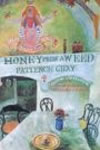Honey from a Weed

(order)
(February 27, 2006)
The Writer told me to read this, and she was right.
In many ways, Patience Gray stands firmly in the tradition of M. F. K. Fisher: this is a book of adventurous cooking in places you aren't likely to live, under conditions you aren't likely to endure. Gray lived and travelled with a sculptor, Norman Mommens, who wanted to work right where the stone was quarried, and so Grey finds herself cooking over open fires outside a succession of precarious quarryside cottages, cooking whatever the spare daughters of her peasant neighbors can teach her to cook.
Fisher wrote to describe her experiences of a vanished time and a world now beyond reach. Gray cooks, and expects you to cook too, and in her approach lie the seeds of the empirical revolution that gave rise to Cook's and Chocolate and Zucchini and the rest of today's "let's try it!" food writing. Her approach isn't quite narrative and isn't quite systematic, but chapters become ad hoc explorations of a food idea -- pounded sauces like pesto in their various forms, or approaches to taking advantage of the plentiful herbs that grow like weeds in places where those herbs are weeds.
Gray had a wonderfully elliptical approach to writing. She doesn't alternate between narrative and recipe, she doesn't introduce or explain, and her prose is almost always in transition, as she was, from place to place, from the challenges of the always-inadequate supplies and perpetually peculiar ingredients to the mysteries of dialects and customs in her latest fastness.